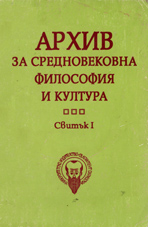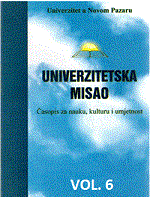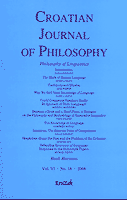
We kindly inform you that, as long as the subject affiliation of our 300.000+ articles is in progress, you might get unsufficient or no results on your third level or second level search. In this case, please broaden your search criteria.







Autor u ovoj studiji razmatra više aspekata Muminovićeve kritičke filozofije. Riječ je o analizi opusa jednog od najkompleksnijih, uz Muhića i Filipovića, bošnjačkih i balkanskih mislilaca XX stoljeća. U fokusu istraživačkog postupka, pisac je posebno usmjerio pažnju na Muminovićev epistemološko-dijalektički i kritičko-konstruktivni metod u filozofiji. Zatim, razmatrao je njegovo etičko gledište kao ljudsko bivstvovanje, što predstavlja u biti jedno osobeno razumijevanje filozofije ideologije i moderniteta. U tom kontesktu, Muminović se predstavlja, kao veoma egzistencijalan mislilac, koji svojim djelima promišlja dijalektiku mišljenja, posebno povezuje recepciju Blohovih principa nade do aktualne kritike totalitarizma, što je predmet njegovog životnog djela „Zarobljeni um.“ Upravo, Muminovićeva kritika totalitarnih režima, omogućava modernom čitatelju, da prepozna recidive neostaljinizma i neofašizma u današnjem svijetu. Upravo ova dimenzija Muminovićevog kritičko-filozofskog diskursa, mu daje takvo visoko mjesto, ne samo u bošnjačkoj već i u europskoj filozofskoj misli, pa možemo slobodno konstatovati, da je riječ o jednom od posljednjih velikih europskih filozofa (koji je rođen u Sandžaku, a svoju afirmaciju je postigao kao profesor filozofije i etike na Sarajevskom univerzitetu). Ključni aspekti Muminovićeve kritičke filozofije se ogledaju kroz poimanje uvođenja u filozofsko mišljenje, razumijevanje etičkih fenomena, kritika ideologije (posebno staljinske), te filozofije praksisa i drugih. Zato svijet Muminovićeve filozofije, privlači pažnju mnogih istraživača, jer je po svojoj prirodi ne samo kritička, već idejno originalna, čime su mu ukazana posebna priznanja, osamdesetoih godina XX stoljeća, kako od kolega iz beogradskog, tako i zagrebačkog filozofskog kruga. Na ovaj način, autor nastoji da otvori filozofski sistem dr Rasima Muminovića i predstavi ga širem krugu kolega i drugih čitatelja.
More...
Cijelo dosadašnje raspravljanje govori o odnosu spekulacije i filozofije, te bi već iz svega toga moglo biti dostatno jasno u čemu se sastoji sama bit odnosa. No, s obzirom na želju i nastojanje da se problem aktualizira i ukaže kako je taj problem takvoga karaktera – iako se to iz samog naslova ne može uvidjeti, nego možda upravo suprotno – da se to tiče svakog, pa time prije svega i suvremenog čovjeka (pri čemu se pod pojmom »čovjeka«, dakako, razumije i žena pa to možda i ne bi trebalo posebno naglašavati!) i njegova svakidašnjeg života, smisaono je i metodički primjereno u ovom odjeljku sažeto rekapitulirati ono bitno u odnosu spekulacije i filozofije, jer ovdje nije riječ samo o njima. Kad se kaže: »odnosu«, onda je već tim određenjem na djelu nužno upravo prethodno spekulativno ukazivanje, da je ovdje riječ o produkciji (produciranju, proizvođenju, proizvodnji) tog odnosa, da bi do njega uopće – moglo doći. Taj i takav odnos se proizvodi i na djelu je kroz čitavu dosadašnju (klasnu,jer druge nema!) historiju i njezin je rezultat, tako da do današnjeg dana živimo i potvrđujemo kako se naš život odvija i kreće samo, jedino i isključivo na osnovi ili »po principu« tog – po drugima – proizvedenu odnosu, ne pitajući za njegovo podrijetlo i mogućnost, što ujedno znači i mogućnost drugačijega nego što već jest! On nam je naprosto dan i naslijeđen, i mi ga uzimamo, shvaćamo, pa čak i (filozofijski i na svaki drugi način) spoznajemo kao nešto – samo po sebi razumljivo. U tom smislu živimo u najboljem slučaju kao – pravi ili dobri (a često vrlo loši) filozofi, a da do spekulacije još nismo dospjeli. U tome pak ujedno leži »prava tragika« (koju su nekada stari Grci u svojim poznatim tragedijama povezivali sa sudbinom,to jest s nečim što vlada nama kao neka nepoznata i tuđa sila, kojoj kao takvoj nismo i ne možemo biti »gospodari«, nego ona vlada nama i našim životima – neumitno!). To je zbiljska tragika naše svakidašnje egzistencije. Ako bismo to željeli iskazati upravo filozofijskim jezikom, to bi glasilo da se naš život odvija na razini – svijesti (ili: tzv. zdravog razuma), a nikada ili vrlo rijetko na razini – samosvijesti (ili: uma). Ovdje osim toga leži najveća teškoća za čovjeka kao čovjeka: on više nije životinja, a još nije (i nikada neće biti) – bog, pa se čovjekov život odvija »između« dvaju savršenstava: životinjske vrste i božanske samosvijesti najvišeg bića. To znači da je čovjek po svojoj biti takvo biće koje nikada ne može dospjeti do toga da bi stalno ili neprekidno mogao biti i djelovati kao – samosvjesno biće.
More...
In Devitt’s view, linguistic intuitions are opinions about linguistic pro-duction or products, most often one’s own. They result from ordinary empirical investigation, so “they are immediate and fairly unrefl ective empirical central-processor responses to linguistic phenomena”, which reactions are, moreover, theory-laden, where the ‘theory’ encompasses all sorts of speaker’s beliefs. The paper reconstructs his arguments, places his view on a map of alternative approaches to intuitions, and offers a defense of a minimalistic “voice-of-competence” view. First, intuitions are to be identifi ed with the data, the minimal “products” of tentative lin-guistic production of naïve speaker-listeners, and not with their opinions about the data. Second, the data involve no theory and very little proto-theory. Third, although there might be admixtures of guesswork in the conscious production of data, these are routinely weaned out by linguists. Finally, mere acceptance of the “voice of competence” does not land us in any objectionable Cartesianism: it is compatible with naturalism and with distrust of a priori philosophy.
More...

The author argues that the standard view about language, seen as fair-ly stable abstract system of communication, is a myth. Standard view is badly mistaken and the alternative picture is offered in which there is a core part of our linguistic competence that is fi xed by biology and this provides a basic skeleton which is fl eshed out in different ways on a conversion-by-conversation basis. Why certain people communicate with each other? The answer to this question is not because they speak the same language. We cannot see how communication can emerge from the standard picture of language if we do not start investigating the nature of our linguistic coordination strategies, since there is not a thing there––a language––that helps us to communicate.
More...



My contribution takes up a set of methodological and philosophical issues in linguistics that have recently occupied the work of Devitt and Rey. Devitt construes the theories of generative linguistics as being about an external linguistic reality of utterances, inscriptions, etc.; that is, Devitt rejects the ‘psychologistic’ construal of linguistics. On Rey’s conception, linguistics concerns the mental contents of speaker/hearers; there are no external linguistic items at all. I reject both views. Against Devitt, I argue that the philosophical issues in linguistics should be framed in terms of the theories themselves, not pre-theoretical conceptions from either philosophy or commonsense as to what linguistics is about or what a language is. In this light, I suggest that Devitt’s key arguments (concerning parameter setting, psychological reality, and the role of intuitions) do not make sense of current linguistic inquiry and so do not offer an adequate philosophical basis of that work. To this extent, I agree with Rey. Our differences emerge over the putative role of content in linguistic inquiry and how the concept of computation ought to be understood. Following the lead of Chomsky’s recent philosophical remarks, I argue that a theory of the language faculty should be understood as an abstract specification of the function that pairs ‘sound’ with ‘meaning’ rather than as a specification of the content the mind represents. But doesn’t ‘computation’ presuppose ‘representation’? I argue for a negative answer, at least if ‘representation’ is read intentionally. A ‘representation’ can be construed as brain structure that, at the present stage of inquiry, can only be picked out via the abstract concepts of linguistic theory. We are entitled to posit such structures insofar as they earn their explanatory keep over the output of the faculty. The linguistic function is a way of setting the boundary conditions on what the brain must be doing such that humans get to be competent speaker/hearers, although we do not therefore take the function to be a story of the causal spring of linguistic performance.
More...
This paper considers a form of scepticism according to which sentences, along with other linguistic entities such as verbs and phonemes, etc., are never realized. If, whenever a conversational participant produces some noise or other, they and all other participants assume that a specifi c sentence has been realized (or, more colloquially, spoken), communica-tion will be fl uent whether or not the shared assumption is correct. That communication takes place is therefore, one might think, no ground for assuming that sentences are realized during a typical conversation. I re-ject both this ‘folie-à-deux’ view and the arguments for it due to Georges Rey. I do so by drawing on Gilbert Harman’s no-false-lemmas principle. Since testimony is a form of knowledge and, according to the principle, knowledge cannot depend essentially on false assumptions, testimony is incompatible with the claim that sentence realization is but an illusion. Much of the paper is given over to defending this appeal to the no-false-lemmas principle. After all, a more attractive option might seem to be to infer instead that the principle is itself falsifi ed by the folie-à-deux view.
More...
In his latest book, Michael Devitt rejects Chomsky’s mentalist conception of linguistics. The case against Chomsky is based on two principal claims. First, that we can separate the study of linguistic competence from the study of its outputs: only the latter belongs to linguistic inquiry. Second, Chomsky’s account of a speaker’s competence as consisiting in the mental representation of rules of a grammar for his language is mistaken. I shall argue, first, that Devitt fails to make a case for separating the study of outputs from the study of competence, and second, that Devitt mis-characterises Chomsky’s account of competence, and so his objections miss their target. Chomsky’s own views come close to a denial that speaker’s have knowledge of their language. But a satisfactory account of what speakers are able to do will need to ascribe them linguistic knowledge that they use to speak and understand. I shall explore a conception of speaker’s knowledge of language that confirms Chomsky’s mentalist view of linguistics but which is immune to Devitt’s criticisms.
More...
Elsewhere I have argued that standard theories of linguistic competence are committed to taking seriously talk of “representations of” standard linguistic entities (“SLEs”), such as NPs, VPs, morphemes, phonemes, syntactic and phonetic features. However, it is very doubtful there are tokens of these “things” in space and time. Moreover, even if were, their existence would be completely inessential to the needs of either commu-nication or serious linguistic theory. Their existence is an illusion: an extremely stable perceptual state we regularly enter as a result of being stimulated by the wave forms we regularly produce when we execute our intentions to utter such tokens (a view I call “Folieism”). In his Ignorance of Language, Michael Devitt objects to this view, arguing that, “On Rey’s view, communication seems to rest on miraculous guesses.” I argue here that my view is not prey to his objections, and actually affords a scientifi -cally more plausible view than his “empiricist” alternative. Specifi cally, I reply to his objections that my view couldn’t explain the conventionality of language and success of communication (§2.1), that I am faced with intractable diffi culties surrounding the identity of intentional inexistents (§2.2), and that, contrary to my view, SLEs can be relationally defi ned (§2.3). Not only can Folieism survive Devitt’s objections, but (§3) it also provides a more satisfactory account of the role of linguistic intuitions than the “empirical” account on which he insists.
More...
This paper defends the commonsense conception of linguistic competence according to which linguistic competence involves propositional knowledge of language. More specifically, the paper defends three propositions challenged by Devitt in his Ignorance of Language. First, Chomskian linguists were right to embrace this commonsense conception of linguistic competence. Second, the grammars that these linguists propose make a substantive claim about the computational processes that are presumed to constitute a speaker’s linguistic competence. Third, Chomskian linguistics is indeed a subfield of psychology, in the business of characterizing the linguistic competence of speakers.
More...